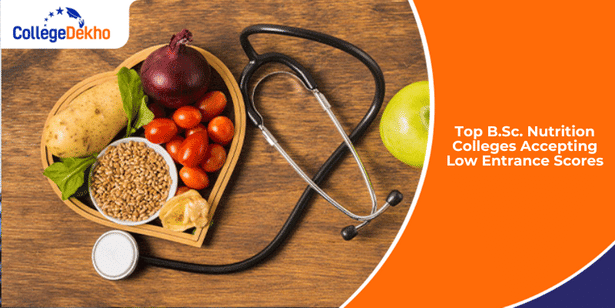
If you are planning to pursue a B.Sc. in Nutrition , knowing which are the top B.Sc. Nutrition colleges accepting low entrance scores will be useful. Popular colleges that accept low scores for a B.Sc. in Nutrition course and have a relatively easier admission process include Calcutta University, J.D. Birla Institute, Adamas University, Brainware University, and Lovely Professional University (LPU). The admission criteria for B.Sc. in Nutrition may be different for different colleges, especially for ones accepting low scores, so you must visit the official website of each of your preferred institutes before applying for admission.
Also Read: NIRF College Rankings 2025
List of B.Sc Nutrition Colleges Accepting Low Entrance Scores
Check out the list of top B.Sc. Nutrition, along with other details mentioned below:
College / Institute | Estimated Total Course Fees | Average Placement Salary |
|---|---|---|
INR 3,60,000 | INR 4 – 7 LPA | |
INR 3,30,000 | INR 3.5 – 6 LPA | |
INR 3,00,000 | INR 3 – 6 LPA | |
INR 2,70,000 | INR 3 – 5.5 LPA | |
INR 30,000 – INR 40,000 total tuition (for B.Sc in Food & Nutrition) | INR 3.5 LPA | |
NA | INR 3-5 LPA | |
INR 2-3 lakhs for 3-yr B.Sc Food Science & Nutrition | INR 2.9 LPA | |
INR 3-4 lakhs total for B.Sc Honors Nutrition & Dietetics | INR 3-5 LPA | |
INR 47,160 total for 3 years for B.Sc Honors Nutrition | INR 2.5-4 LPA | |
INR 8,730 total for 3-year B.Sc. Food Science & Nutrition | INR 2-4 LPA | |
INR 237,500 total for B.Sc. Nutrition & Dietetics | INR 4-6 LPA | |
INR18,000 - INR 25,000 depending on incremental fee rises | INR 2-4 LPA | |
INR 2,700 – INR 95,734 | INR 2-5 LPA | |
INR 2,85,000 - INR 3,00,000 | INR 4-6 LPA | |
INR 2.5-3.0 lakhs | INR 3-5 LPA |
B.Sc in Nutrition Eligibility Criteria
Find the detailed B.Sc. Nutrition eligibility requirements are mentioned below:
Eligibility Criteria | Description | Details / Requirements |
|---|---|---|
Educational Qualification | Completion of 10+2 or equivalent examination. | Must have studied from a recognized board (CBSE, ICSE, or State Board). |
Stream Required | Science stream (preferred). | Subjects required: Biology, Chemistry, and Physics; some colleges also accept students from Home Science or Agriculture backgrounds. |
Minimum Marks Required | Varies by college. | Generally, 45%–60% aggregate marks in 10+2; top colleges may require 65% or above. |
Entrance Exam (if applicable) | Some universities conduct entrance tests. | Exams like CUET-UG, or institution-level tests (e.g., Christ University Entrance Test). Others are admitted based on merit. |
Age Limit | Usually no strict age limit. | Some institutes may prefer candidates below 25 years at the time of admission. |
Additional Requirements | English proficiency (in most colleges). | English is often required as a core or elective subject in 10+2. |
Reservation Criteria | As per government norms. | Relaxation in marks for SC/ST/OBC/EWS/PH candidates as applicable. |
Foreign Students Eligibility | Equivalent qualification from recognized foreign boards. | Must provide valid academic transcripts and proof of English proficiency (e.g., IELTS/TOEFL in some cases). |
Hopefully, this article will help you in your search for the top B.Sc. Nutrition Colleges accepting low entrance scores. Check the articles below to know more!
Related Articles:
For any admission-related guidance, call our toll-free number 1800-572-9877, or fill out our Common Application Form (CAF) . Stay tuned with CollegeDekho for more updates related to UG/PG admission and colleges!
FAQs
A B.Sc. in Nutrition is moderately challenging, requiring a strong understanding of biology, chemistry, and human physiology, along with practical skills in diet planning and food science, but consistent study and interest make it manageable.
Core subjects in a B.Sc. Nutrition courses include Human Physiology, Biochemistry, Food Science, Dietetics, Community Nutrition, Public Health, Microbiology, Nutritional Assessment, Food Safety, and Clinical Nutrition.
After completing a B.Sc. in Nutrition, job opportunities include Dietitian/Nutritionist, Food Technologist, Clinical Nutritionist, Wellness Consultant, Public Health Nutritionist, Research Assistant, Sports Nutritionist, Hospital Nutrition Officer, and Roles in the Food Industry or NGOs.
Yes, a Science background is generally required for a B.Sc. in Nutrition, with subjects like Biology, Chemistry, and Physics, as they provide the essential foundation for understanding food science and human physiology.
Entrance exams for B.Sc. in Nutrition vary by university and may include CUET-UG, BHU-UET, LPUNEST, Christ University Entrance Test, KIITEE, or state-level exams like WBJEE or MHT-CET, while many colleges offer merit-based admission.
















Similar Articles
NEST Exam 2026 Registration: Why This Timeline Matters for Science Aspirants
CUET Business Studies 2026: Preparation Tips, Scoring Topics, Weightage
CUET 2026 Computer Science: Preparation Tips, Scoring Topics, Weightage
CUET 2026 Knowledge Tradition Syllabus (Released): Check Topics, Pattern, Download PDF
Important Topics for CUET Teaching Aptitude 2026
Important Topics for CUET Psychology 2026